
Advanced Space Architectures Program: Championing Innovation in Next-Generation In-Space Operations
Summary
America’s leadership in space exploration and utilization could greatly accelerate by using a fundamentally different approach to in-space operations than that which exists today. Most of today’s spacecraft are locked into their launch configurations, with little or no ability to be updated or serviced once in space. But by leveraging recent and emerging capabilities to manufacture, assemble, and service spacecraft in space, we can dramatically improve the cost-effectiveness, productivity, and resiliency of our space systems.
To achieve this, the Biden-Harris Administration should launch a new Advanced Space Architectures Program (ASAP) to enable a new generation of in-space operations. ASAP would operate under a public-private consortium model to leverage government investment, engage a broad community, and bring in the support of international partners. In this memo, we propose two specific missions that the next administration could undertake early to initiate the ASAP program and demonstrate its efficacy. Initiating ASAP as soon as possible will help the new administration’s mission to build back better: for our economy, for science and exploration, for international leadership in mitigating the climate crisis, and for the security of our nation.
A deeper understanding of methane could help scientists better address these impacts – including potentially through methane removal.
We are encouraged that the Administration and Congress are recognizing the severity of the wildfire crisis and elevating it as a national priority. Yet the devil is in the details when it comes to making real-world progress.
The good news is that even when the mercury climbs, heat illness, injury, and death are preventable. The bad news is that over the past five months, the Trump administration has dismantled essential preventative capabilities.
The Federation of American Scientists supports H.Res. 446, which would recognize July 3rd through July 10th as “National Extreme Heat Awareness Week”.